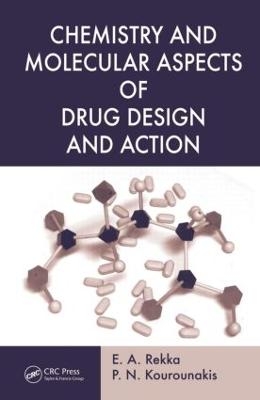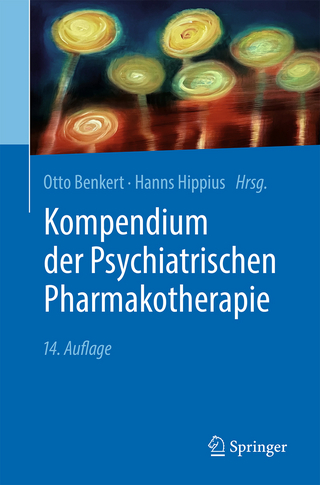
Chemistry and Molecular Aspects of Drug Design and Action
Crc Press Inc (Verlag)
978-0-8493-9006-7 (ISBN)
- Titel z.Zt. nicht lieferbar
- Versandkostenfrei innerhalb Deutschlands
- Auch auf Rechnung
- Verfügbarkeit in der Filiale vor Ort prüfen
- Artikel merken
An ever-increasing demand for better drugs, elevated safety standards, and economic considerations have all led to a dramatic paradigm shift in the way that drugs are being discovered and developed. Known as rational drug design, this contemporary process is defined by three main steps: the discovery of lead compounds, surgical manipulation to develop pharmacophores, and further optimization to produce the best compounds.
Chemistry and Molecular Aspects of Drug Design and Action brings together an impressive collection of world-renowned pharmacochemistry scientists who are currently defining the emergence of rational drug design. Offering insight from their own specialized research, these pioneers highlight the variety of approaches being employed in this field, including those that start by considering either molecular mechanisms of drug action, or the metabolizing enzyme action occurring in the structure of a drug molecule. Another approach they explore is one that starts from the pathobiochemistry and pathophysiology of target diseases. Furthermore, the book also considers drug development that makes use of already developed compounds stored in data banks.
Divided into five parts, each dedicated to various aspects of the classical medicinal chemistry approach, the text makes it easy for readers to focus on a field of specific interest.
Chemical, Biochemical, and Biological Aspects of Pathophysiological Conditions
Classical Medicinal Chemistry
Drug Design, Chemical and Molecular Aspects of Drug Action
Drug Xenobiotic Metabolism
Physical Organic and Theoretical Medicinal Chemistry
While each section can be studied independently, the combined material in this volume provides the most comprehensive overview available on rational drug design. This work is an invaluable resource both for those entering the field, as well as those researchers looking to b
E. A. Rekka, P. N. Kourounakis
Introduction: Rational Drug DesignBased Mainly on the Pathobiochemistry of the Disease.
Chemical, Biochemical, and Biological Aspects of Pathophysiological Conditions Inflammatory Mechanisms in Alzheimer’s Disease and OtherNeurodegenerative Disorders.Treatment Development Strategies for Alzheimer’s Disease.Lipoprotein-Associated Phospholipase A2 as a New PrognosticFactor for Coronary Artery Disease. New Molecular Targets for the Prevention and Treatment of Gastrointestinal Ulcers and Inflammation Stress Activates Corticotropin Releasing: Factor SignalingPathways: Implication in Functional Bowel Disorders. Classical Medicinal Chemistry Design, Synthesis, and Pharmacological Evaluation of High-Affinity and Selectivity Sigma-1 and Sigma-2 Receptor Ligands. Synthesis of Biologically Active Taxoids. From the Molecular Pharmacology to the Medicinal Chemistry of Cannabinoids. An Appraisal of Fomocaines: Current Situation and Outlook. Ligands for the GABA Recognition Site at the GABAA Receptor: Structure-Activity Studies. Strategies for Development of New Lead Structures for Inhibition of Acetylcholinesterase.Drug Design, Chemical and Molecular Aspects of Drug ActionDiscovery of Potent and Selective Inhibitors of HumanAldosterone Synthase (CYP11B2): A New Target for theTreatment of Congestive Heart Failure and MyocardialFibrosis—a Review. Thiocarboxanilides: A New Class of Nonnucleoside ReverseTranscriptase Inhibitors (NNRTIs) with Great Potential for theTreatment of Human Immunodeficiency Virus Type 1 (HIV-l)Infections.Histamine H3-Receptor Agonists and Antagonists: Chemical,Pharmacological, and Clinical Aspects.Anti-Inflammatory Actions of Flavonoids and StructuralRequirements for New Design.Molecular Mechanisms of H2O2-Induced DNA Damage: The Action of Desferrioxamine.LNA (Locked Nucleic Acid) and Functionalized LNA: Toward Efficient Gene Targeting.Drug – Xenobiotic Metabolism The Effect of Diet on Drug Metabolism.
| Erscheint lt. Verlag | 9.5.2008 |
|---|---|
| Verlagsort | Bosa Roca |
| Sprache | englisch |
| Maße | 156 x 234 mm |
| Gewicht | 860 g |
| Themenwelt | Medizin / Pharmazie ► Medizinische Fachgebiete ► Pharmakologie / Pharmakotherapie |
| Naturwissenschaften ► Biologie | |
| Technik | |
| ISBN-10 | 0-8493-9006-0 / 0849390060 |
| ISBN-13 | 978-0-8493-9006-7 / 9780849390067 |
| Zustand | Neuware |
| Haben Sie eine Frage zum Produkt? |
aus dem Bereich


